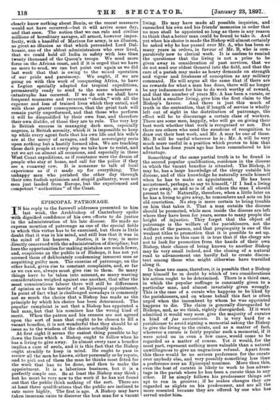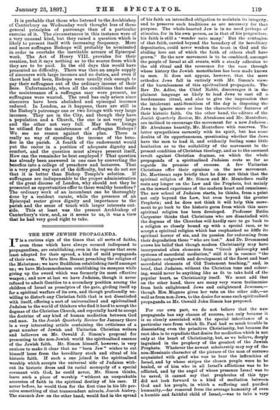EPISCOPAL PATRONAGE.
IN his reply to the farewell addresses presented to him last week, the Archbishop of Canterbury spoke with dignified confidence of his own efforts to do justice in the administration of his late diocese. He made no express mention of patronage as one of the special fields in which this virtue has to be exercised, but there is little doubt that it was in his mind, and still less that it was in the mind of his hearers. Justice, it is true, is more directly concerned with the administration of discipline; but here the opportunities for making mistakes are much fewer, and, suspicious as the public is of Bishops, it has not yet accused them of deliberately condemning innocent men or acquitting guilty men. The exercise of patronage, on the other hand, gives rise to constant complaints, and, so far as we can see, always must give rise to them. So many things have to be taken into account, so many warring -considerations weighed against one another, that after the most conscientious labour there will still be differences of opinion as to the merits of an Episcopal appointment. In point of fact what is challenged nowadays is commonly not so much the choice that a Bishop has made as the principle by which his choice has been determined. The popular complaint is not that a Bishop has appointed a bad man, but that his nominee has the wrong kind of merit. When the patron and his censors are not agreed upon the sort of man that ought to be chosen to fill a vacant benefice, it is not wonderful that they should be at issue as to the wisdom of the choice actually made.
At first sight it seems the easiest thing possible to lay down the lines which a Bishop ought to follow when he has a living to give away. In almost every case a benefice implies a cure of souls, and it is this fact that the Bishop ought steadily to keep in mind. He ought to pass in review all the men he knows, either personally or by repute, and to pick out of them the man he thinks most fitted for the work that has to be done, and then to make the appointment. It is a laborious business, but it is a perfectly simple one. So at least the Bishop may think ; but he must be very new to the work if he has not found out that the public think nothing of the sort. There are at least three qualifications that the public are inclined to rate more highly. The first is age. A Bishop may have taken immense nains to discover the best man for a vacant :living. He may have made all possible inquiries, and ransacked his own and his friends' memories in order that no man shall be appointed so long as there is any reason to think that abetter man could be found to take it. And yet when his choice is made the Bishop will almost certainly be asked why he has passed over Mr. A, who has been so many years in orders, in favour of Mr. B, who is com- paratively new to clerical work. It is useless to remind the questioner that the living is not a prize to be given away in consideration of past services, that we do not send our oldest General into the field, and that the care of a parish may make as heavy demands on strength and vigour and freshness of conception as any military command. He will argue all the same that if there are no rewards for what a man has done, there will no longer be any inducement for him to do work worthy of reward, and that the number of years Mr. A has been a curate, or has held a smaller living, give him the first claim to the Bishop's favour. And there is just this much of truth in the contention, that if length of service is wholly left out of sight in the distribution of patronage, the effect will be to discourage a certain class of workers. There are some men, happily, who will go on giving their best work whether that work is recognised or not. But there are others who need the sunshine of recognition to draw out their best work, and Mr. A may be one of these. Mr. B will be useful wherever he is ; Mr. A will be very much more useful in a position which proves to him that what he has done years ago has been remembered to his advantage.
Something of the same partial truth is to be found in the second popular qualification, residence in the diocese in which the vacant benefice is situated. The Bishop, it may be, has a large knowledge of the clergy outside his diocese, and of this knowledge he naturally avails himself when he has to make an appointment. He has been accustomed, perhaps, to say to himself, 'If I had a living to give away, so and so is of all others the man I should present to it.' Naturally, therefore, when a little later on he has a living to give away, he remembers and acts on his old conviction. No step is more certain to bring trouble on him that takes it. That a man outside the diocese should be promoted, while men inside the diocese are left where they have been for years, seems to many people the height of injustice. They forget that the object of patronage is the welfare of the parishioners, not the welfare of the parson, and that propinquity is one of the weakest titles to promotion that it is possible to set up. And yet even in this case it is true that if the clergy are not to look for promotion from the hands of their own Bishop, their chance of being known to another Bishop may be very small indeed, and the closing of a natural road to advancement can hardly fail to create discon- tent among those who might otherwise have travelled along it.
In these two cases, therefore, it is possible that a Bishop may himself be in doubt by which of two considerations his action ought to be determined. There is a third case, in which the popular suffrage is constantly given to a particular man, and almost invariably given wrongly. This is the case of a curate who happens to be liked by the parishioners, and on whose behalf this fact is often urged when the incumbent by whom he was appointed happens to die. The claim is generally disregarded by Bishops, and, as we think, rightly disregarded. If it were admitted it would very soon give the majority of curates a kind of jus successionis. It is very hard for a parishioner to avoid signing a memorial asking the Bishop to give the living to the curate, and as a matter of fact, wherever a curate is fairly popular such a memorial, if it were acted on in even a few cases, would come to be regarded as a matter of course. Yet it would, for the most part, represent nothing more valuable than a natural unwillingness to give an ungracious refusal. Apart from this there would be no serious preference for the curate over anybody else, and very possibly something less than a preference over an Episcopal nominee. More than this, even the best of curates is likely to work to less advan- tage in the parish where he has been a curate than in any other. If he simply follows his predecessor things are apt to run in grooves ; if he makes changes they are regarded as slights on his predecessor, and are all the more resented because they are offered by one who has served under him. It is probable that those who listened to the Archbishop of Canterbury on Wednesday week thought less of these general principles of patronage than of a particular exercise of it. The circumstances in this instance were of a very unusual kind, but they raised a question which is likely to present itself with increasing frequency. More and more suffragan Bishops will probably be nominated in order ts overtake the inevitable arrears of Episcopal work. The Act of Henry VIII. provides for their creation, but it says nothing as to the source from which they are to be paid. In the old days this would have presented no difficulty. There was then an ample supply of sinecures with large incomes and no duties, and even if there had not been, Bishops were usually rich enough to pay their suffragans out of the ordinary income of their Sees. Unfortunately, when all the conditions that made the maintenance of a suffragan easy were present, no suffragans were wanted. The need has only arisen since sinecures have been abolished and episcopal incomes reduced. In London, as it happens, there are still in the Bishop's patronage one or two livings with very large incomes. They are in the City, and though they have a population and a Church, the one is not very large and the other not very full. May these livings be utilised for the maintenance of suffragan Bishops ? We see no reason against this plan. There is really no way of spending the income of the bene- fice in the parish. A fourth of the endowment would put the rector in a position of adequate dignity and comfort, and the question must always present itself, How can the remainder be best employed ? That question has already been answered in one case by converting the benefice into a college of preachers and lecturers. That is a very good way out of the difficulty, but we do not see that it is better than Bishop Temple's solution. If suffragans are indispensable to the proper administration of the great diocese of London, why should not they be presented as opportunities offer to these wealthy benefices ? The ordinary work of an incumbent can be thoroughly done by a resident curate, while the presence of an Episcopal rector gives dignity and importance to the parish and the sense of touch with larger interests out- side. This at least was the present Archbishop of Canterbury's view, and, as it seems to us, it was a view that he had very good right to take.



































 Previous page
Previous page